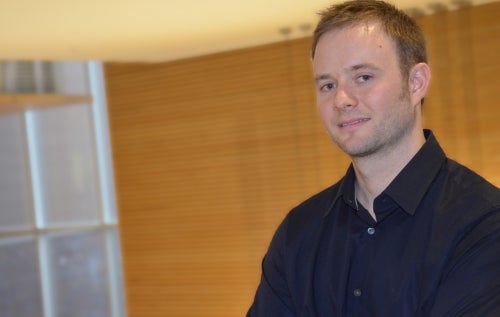
Waterloo researcher looks at what makes markets tick…or tank
Risk-taking business leaders can create “financial pollution.”

Risk-taking business leaders can create “financial pollution.”
By By Christian Aagaard Communications and Public AffairsJames Thompson saw trouble when he was working on his doctorate a few years before the credit collapse that started in 2008.

Photo credit:Patty Mah
He was studying risk in the financial world, specifically unregulated investment contracts known as credit default swaps (CDS). One party insures the debt instruments -- bonds and mortgages, for example -- of another and the second party pays premiums.
A popular product, CDS’s were often propped up on weak collateral and embedded in dense contracts that distanced buyers of CDS’s from the root debt.
“People couldn’t believe this was a real problem,” says Thompson, now an assistant professor at the University of Waterloo’s School of Accounting and Finance.
As the dust still settles from ruined investment firms and wrecked households, the credit collapse has become an area of intense academic study, especially around building stability. Thompson still studies CDS’s, arguing they should be better understood rather than entirely avoided.
Never in Canada, eh?
Meanwhile, Canadians needn’t feel too smug that their more conservative, more regulated financial system came through the credit collapse better than most. Americans have more banks to choose from; our banking is concentrated among several big players.
If one were to fold, the impact would be severe and widespread and we’d have less banking competition when it was over, Thompson says.
He also examines the character of the financial world: “Why people do what they do, and what information they have when they do it.”
By focusing only on the advantages that risk-taking delivers in the short-term, some business leaders create what he calls “financial pollution” for others downstream.
This is where checks are needed, Thompson says: “How do we get people in power to have a more long-term perspective in their decision-making.”

An international team of researchers has proposed ways to train large language models to be wiser and to measure AI wisdom (Getty Images/PhonlamaiPhoto).
Read more
International study suggests ways to train large language models in wise reasoning and measure the wisdom of AI

Read more
To meet our AI ambitions, we’ll need to lean upon Canada’s unique strengths

Read more
New research from the University of Waterloo centres Haudenosaunee-led efforts in the repatriation and reclamation of cultural and intellectual property
The University of Waterloo acknowledges that much of our work takes place on the traditional territory of the Neutral, Anishinaabeg, and Haudenosaunee peoples. Our main campus is situated on the Haldimand Tract, the land granted to the Six Nations that includes six miles on each side of the Grand River. Our active work toward reconciliation takes place across our campuses through research, learning, teaching, and community building, and is co-ordinated within the Office of Indigenous Relations.